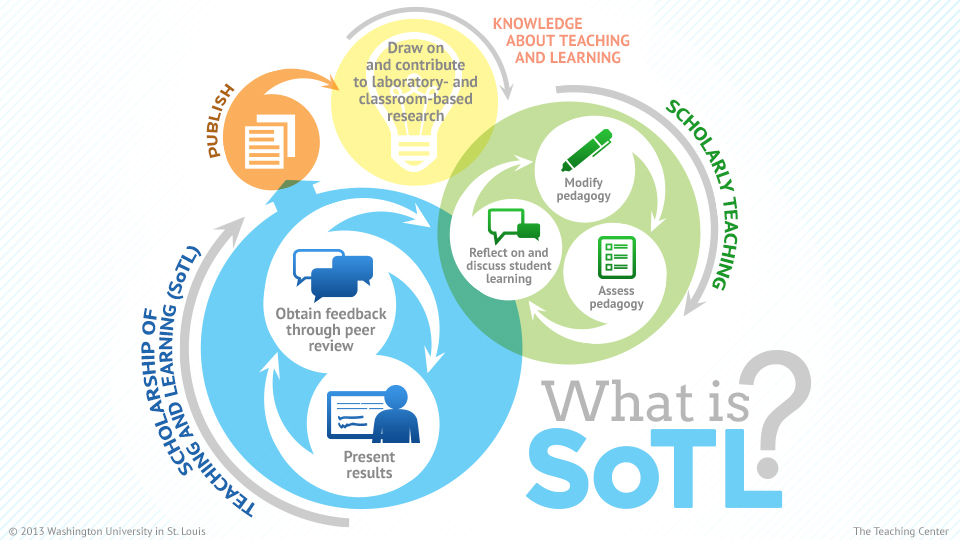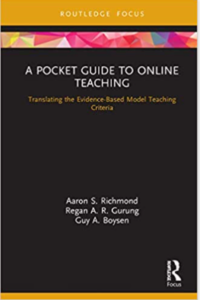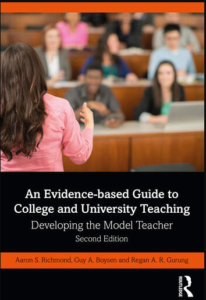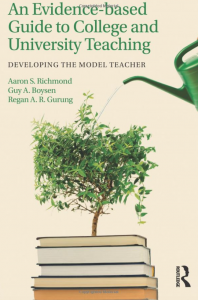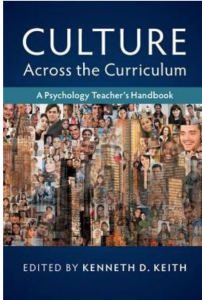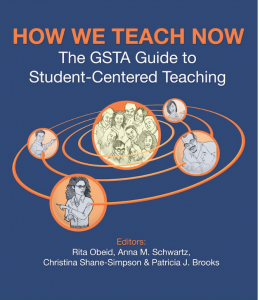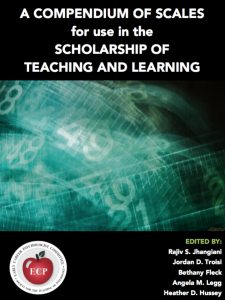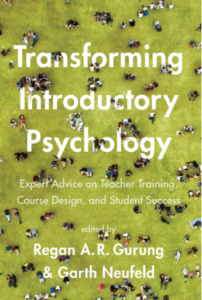In more than 80 peer-reviewed journal articles, books, and book chapters, I have explored evidence-based pedagogical approaches to instruction in higher education. I have specifically investigated the use of learning strategies, the testing effect, model teaching competencies, the efficacy of instructional strategies, and various other topics in the scholarship of teaching and learning in both psychology courses and other academic domains. I also focus on evidence-based practices of syllabus construction and what improves or predicts student ratings of instruction. As evident by publishing and presenting research with over 25 undergraduate and graduate students, I strongly believe in mentoring students through the research process in hopes to help shape future leaders in psychology and SoTL research.
I am currently taking on student researchers in this lab. Please contact me if you are interested in becoming a student researcher @ [email protected].
Below you will find a list of my current research projects:
Recent SoTL Books
- Richmond, A. S., Gurung, R. A. R., & Boysen, G. (2022). An evidence-based guide to college and university teaching: Developing the model teacher. (2nd edition). Routledge.
- Richmond, A. S., Gurung, R. A. R., & Boysen, G. (2021). A pocket guide to online teaching: Translating the evidence-based model teaching criteria. Taylor & Francis.
- Richmond, A. S. Gurung, R. A. R., & Boysen, G. (2016). An evidence-based guide to college and university teaching: Developing the model teacher. Routledge.
Recent SoTL Book Chapters
- Hudson, D. L., Richmond, A. S., Martin Hard, B., Dunn, D. S., & Musselman, R. (2021). Designing an introductory psychology course: A guide to blending situation-specific factors with empirical evidence. In R. A. R. Gurung & G. Neufeld (Eds.) Transforming Introductory Psychology: Expert advice on teacher training, course design, and student success. (pp. xx). American Psychological Association Press.
- Martin Hard, B., Dunn, D. S., Musselman, R., Hudson, D. L., & Richmond, A. S. (2021). Designing the Introductory psychology course: What the research, teachers and students suggest we do. In R. A. R. Gurung & G. Neufeld Transforming Introductory Psychology: Expert advice on teacher training, course design, and student success. American Psychological Association Press.
- Gurung, R. A. R., Soicher, R. N., Boysen, G. A., & Richmond, A. S. (2020). Start strong, stay strong: Aspiring to model teaching across the career span. In T. M. Ober, E. S. Che, J. E. Brodsky, C. Raffaele, & P. J. Brooks (Eds.). How we teach now: The GSTA guide to transformative teaching. Retrieved from http://teachpsych.org/ebooks/howweteachnow.
- Richmond, A. S. (2018). Where tides collide: How to integrate culture in teaching cognitive psychology. In K. Keith (Ed.) Culture across the curriculum: A psychology teacher’s handbook. (pp. 265-282). Cambridge University Press.
- Richmond, A. S. (2017). A graduate student’s primer to model teaching: A focus on student-centered syllabi and instructional strategies. In R. Obeid, A. Schwartz, C. Shane-Simpson, P. J. Brooks (Eds.). How we teach now: A GSTA guide to student-centered teaching. Society of Teaching of Psychology, Retrieved from http://teachpsych.org/resources/Documents/ebooks/gstaebook.pdf
- Richmond, A. S. (2015). SoTL scales: The case of missing links. In R. Jhangiani, J. D. Triosi, B. Fleck, A. M. Legg, & H. D. Hussey (Eds.) A compendium of scales for use in the scholarship of teaching and learning. Retrieved from http://teachpsych.org/Resources/Documents/ebooks/compscalesstl.pdf
- Hussey, H. D., Fleck, B. K. B., & Richmond, A. S. (2014). Promoting active learning through the flipped classroom model. In J. Keengwe, G. Onchwari, & J. N. Oigara (Eds.), Promoting active learning through the flipped classroom model (pp. 59-70). IGI Global. doi:10.4018/978-1-4666-4987-3
Recent SoTL Articles
- Richmond, A. S., Boysen, G. A., Gurung, R. A. R., & Naufel, K. Z. (in press). A national study of student and instructor perceptions of introductory psychology. Scholarship of Teaching and Learning in Psychology,
- Richmond, A. S., Ropp, A., Bradford, J., Ignizio. G. S., Hammond. J., Mowder, D., & †Bittmann, J. M. (in press). An ecologically valid study of the testing effect across academic disciplines: A focus on higher- vs. lower-level learning. College Teaching
- Richmond, A. S., †Breedin, O., †Lich, T., †Pletcher, J., & †Sharp, A. (in press). The structure, reliability, and validity of the Universal Design for Learning Syllabus Scale. Journal on Excellence in College Teaching
- Richmond, A. S. (2022). Initial evidence for the Learner-Centered Syllabus Scale: A focus on reliability and concurrent and predictive validity. College Teaching, 70(1), 22.42. https://doi.org/10.1080/87567555.2021.1873726
- Fleck, B., & Richmond, A. S. (2022). Does the instructors gender identity and syllabus design affect students perceptions of their instructor? Teaching of Psychology, https://doi.org/10.1177/00986283211072742
- Boysen, G. A., Gurung, R. A. R., & Richmond, A. S. (2021). Stability and intercorrelations among model teaching characteristics. Scholarship of Teaching and Learning in Psychology, https://doi.org/10.1037/stl0000237
- Richmond, A. S., Boysen, G. A., Hudson, D. L. Gurung, R. A. R., Naufel, K. Z., Neufeld, G., Landrum, R. E., Dunn, D. S., & Beers, M. (2021). The introductory psychology census: A national study. Scholarship of Teaching and Learning in Psychology. 7(3),163-180. https://doi.org/10.1037/stl0000277
- Richmond, A. S. (2021). Initial evidence for the Learner-Centered Syllabus Scale: A focus on reliability and concurrent and predictive validity. College Teaching, https://doi.org/10.1080/87567555.2021.1873726
- Thompson, J., Richmond, A. S., Barboza, B., Bradley, J., White, J. N., & Landrum, R. E. (2020). Measuring what students know: SNAP’s guidelines and suggestions for assessing content in psychology. Teaching of Psychology, 47(4), 262-273. https://doi.org/10.1177/0098628320945113
- Gurung, R. A. R., Richmond, A., Drouin, M., Landrum, R. E., & Christopher, A. N. (2019). The past, present, and future of scholarship of teaching and learning in psychology. Scholarship of Teaching and Learning in Psychology, 5(2), 97–120. https://doi.org/10.1037/stl0000143
- Richmond, A. S., Woody, W. D., Fleck, B. K. B., Becker, S. E., Mace, B. L., Manuel, L., & Kranz, P. (2019). An evidence-based roadmap for success: Part 1—The bumpy road of graduate school. Scholarship of Teaching and Learning in Psychology, 5(1), 37–51. https://doi.org/10.1037/stl0000130
- Richmond, S., Morgan, R. K., Slattery, J., Mitchell, N. G., & †Cooper, A. G., (2019). Project Syllabus: An exploratory study of learner-centered syllabi. Teaching of Psychology, 46, 6-15. doi:10.1177/0098628318816129
- Gurung, R. A. R., Richmond, A. S., & Boysen, G. A. (2018). Studying excellence in teaching: A recap of the story so far. In J. A. Keeley & W. Buskist (Eds.). New Directions for Teaching and Learning, 156, 11-19. doi:10.1002/tl.20312
- Fleck, B., Richmond, A. S., †Rauer, H. M., †Beckman, L., & †Lee, A. (2017). Active reading questions as a strategy to support college students’ textbook reading. Scholarship of Teaching and Learning in Psychology, 3, 220-232. doi:http://dx.doi.org/10.1037/stl0000090
- †Sawyer, J., †Obeid, R., †Bublitz, D., †Schwartz, A. M., Brooks, P. J., & Richmond, A. S., (2017). Which forms of active learning are most effective: Cooperative learning, writing-to-learn, multimedia instruction, or some combination? Scholarship of Teaching and Learning in Psychology, 3, 257-271. http://dx.doi.org/10.1037/stl0000095
- Richmond, A. S., †Bacca, A. M., †Becknell, J. S., & †Coyle, R. P. (2017). Teaching metacognition experientially: A focus on higher versus lower level learning. Teaching of Psychology, 44, 298-305. doi:10.1177/0098628317727633
- Richmond, A. S. (2016). A primer for constructing a learner-centered syllabus: One professor’s journey. IDEA, #60, 1-14. Retrieved from http://www.ideaedu.org/Portals/0/Uploads/Documents/IDEA%20Papers/IDEA%20Papers/PaperIDEA_60.pdf
- Richmond, A. S., Slattery, J., Morgan, R. K., Mitchell, N., & †Becknell, J. (2016). Can a learner-centered syllabus change student’s perceptions of student-professor rapport and master teacher behaviors?. Scholarship of Teaching and Learning in Psychology, 2, 159-168. doi:http://dx.doi.org/10.1037/stl0000066
- Richmond, A. S., Fleck, B., Heath, T., †Broussard, J., & †Skarda, B. D. (2015). Can inquiry-based instruction promote higher-level learning?. Scholarship of Teaching and Learning in Psychology, 1, 208-218. doi:10.1037/stl0000032
- Hussey, H. D., Richmond, A. S., & Fleck, B. A. (2015). A primer for creating a flipped psychology course. Psychology Teaching and Learning, 14(2), 169-181. doi:10.1177/1475725715592830
- Richmond, A. S., Broussard†, K., †Shardy, J. C., †Sanders, K. K., †Sterns, J. L., & †Lieberenz, S. K. (2015). Who are we studying? Sample diversity in teaching of psychology research. Teaching of Psychology, 42, 218-226. doi:10.1177/0098628315587619
- Richmond, A. S., †Berglund M., †Epelbaum, V. B., & †Klein, E. M. (2015). a + (b1) professor student rapport + (b2) humor + (b3) student engagement = (Ŷ) student ratings of instructors. Teaching of Psychology, 42, 119-125. doi:10.1177/0098628315569924
- Richmond, A. S., Murphy Kelsey, B., Curl, L. S., & †Broussard, K. (2015). The effect of immersion scheduling on academic performance and student’s ratings of instructors. Teaching of Psychology, 42, 26-33. doi:10.1177/0098628314562675
